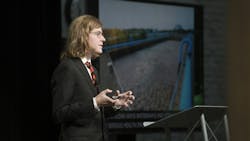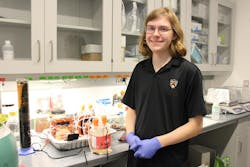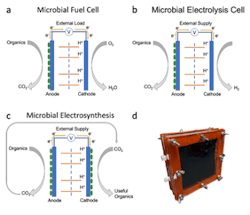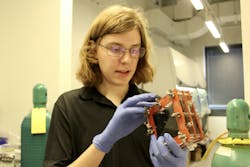The future of wastewater treatment with microbial electrochemistry
The UnWastewater team — a group of finalist students in the Wege Prize competition — looked to microbial electrosynthesis as an emerging technology to realize a circular economy. This solution could help to convert carbon dioxide into organic compounds, enabling waste to be remade into valuable organic chemical feedstocks.
Problems with sustainability
To many, modern wastewater treatment bears all the hallmarks of a magic trick: a mysterious network of pipes, basins and tanks that make waste simply disappear. But, as with all magic acts, one invariably stumbles upon a tell. In the case of wastewater treatment, this tell manifests as money, energy and greenhouse gas (GHG) emissions. As a result, wastewater treatment companies, scientists and engineers are working hard behind the scenes to develop new innovations and technologies that can address these pressing issues and keep the magic act running.
Predominant among these concerns is conventional wastewater treatment’s high cost, often the largest single expenditure for small municipalities. In addition, aeration units consume a massive amount of energy. In fact, if all wastewater were to be treated with conventional methods, such as the activated sludge process, about 3% of the world’s current electricity usage would be consumed.
Although most organic matter in wastewater comes from biological sources, wastewater treatment still represents a localized source of human-generated carbon dioxide (CO2) emissions, a significant component of GHGs, and reports are on the rise indicating that they also emit a significant amount of non-CO2 GHGs, such as methane and nitrous oxide.
Environmentally sound wastewater treatment
Motivated to overcome these problems without compromising the standard of living that modern wastewater treatment has afforded society, UnWastewater competed in the 2023 Wege Prize, an annual competition organized by the Kendall College of Art and Design that challenges students to design solutions to realize a circular economy.
The “circular economy” refers to the idea of designing systems that remove waste from existing linear production and consumption practices. Rather than disposing or recycling waste materials after use, the circular economy asks to eliminate the very idea of waste by promoting efficient, reusable and biodegradable product design.
As such, UnWastewater’s interdisciplinary group of five students from four universities in the United States and United Kingdom developed a solution to the challenges facing the industry. Its research detailed insights into the current state of wastewater treatment and an understanding of emerging technologies, which included site visits to the Scarborough Wastewater Treatment Facility in Narragansett, Rhode Island, and the Hatton Wastewater Treatment Works in the United Kingdom.
The team also met with leading experts in the field of novel wastewater treatment technologies such as professor Bruce Rittmann of Arizona State University, 2018 Stockholm Water Prize winner, and professor Jason Ren of Princeton University, who leads the Water and Energy Technologies Lab.
The team reached out to startup companies and one such company, Aquacycl, provided guidance based on its experience commercializing microbial fuel cells for treating high strength brewery wastewater.
MES transforms wastewater into usable chemical products
Microbial electrosynthesis (MES) has the potential to address many of the environmental concerns about wastewater treatment and will likely lead to the emergence of startups and commercialization within the next decade.
MES, and microbial electrochemical technologies (METs) more broadly, are technologies that share the same basic architecture: a microbial electrochemical cell. In this apparatus, wastewater is fed to bacteria on the surface of an electrode, called an anode, which decomposes the organic matter via an oxidation reaction, a chemical reaction that liberates electrons.
This is similar to the chemical reactions occurring inside an aeration basin. Unlike an aeration basin, however, the bacteria in a microbial electrochemical cell can use the anode, rather than oxygen, as an electron acceptor. This allows the electrons to be harvested as electricity which can then be put to a variety of uses. In particular, MES uses these electrons to stimulate colonies of bacteria on another electrode, called a cathode, to convert CO2 into organic compounds.
The ability to valorize domestic wastewater could close the loop between production and consumption practices by enabling waste to be remade into valuable organic chemical feedstocks. The benefits to the environment and human health are numerous.
MES provides a sustainable alternative to conventional methods of chemical synthesis, which predominantly rely on hydrocarbons derived from oil and gas; helps lower GHG emissions, mitigating the impact of climate change; and maintains high effluent quality and sanitation standards essential for replenishing aquifers and bettering human health. Moreover, through MES, the biology of the cathode cultures can be tailored to target valuable organic compounds, creating an additional revenue stream for treatment plants.
UnWastewater worked with Princeton University’s Water and Energy Technologies Lab to construct lab-scale prototypes of MES wastewater treatment systems. The team’s continual refinement of microbial electrochemical cells over the course of the 2023 Wege Prize competition ultimately led it to win $10,000.
Currently, UnWastewater is working on new prototypes based on tubular microbial electrochemical cells, which have the potential for heightened efficiency. The team’s goal is to develop modular, scalable electrochemical cells that can be used to assemble a demonstration scale reactor at a wastewater treatment plant.
This can be prohibitively expensive for domestic wastewater, so applications are currently limited to low-volume, high strength wastewater, such as side streams of sludge liquors. Nevertheless, efforts are underway in industry and academia to develop more efficient electrochemical cells and membrane materials that can mitigate these issues.
Ultimately, this technology has the potential to unlock significant benefits for the wastewater treatment sector. Even advanced treatment plants, such as those in Grand Rapids, Michigan, the hometown of the Wege Prize, stand to benefit from the removal of high strength sludge liquors.
Grand Rapids City Manager Mark Washington is familiar with the opportunities that Wege Prize hopes to support.
“In the face of growing cities and escalating sustainability and climate change concerns, municipalities should see wastewater not as something to simply clean or dispose of, but as a source of valuable resources with beneficial reuses that can protect and preserve the environment,” said Washington, who met with Green and the Wege Prize teams during the 2023 competition. “Capturing these resources is a great example of what can help a circular economy. These emerging technologies help diminish waste while enhancing resource effectiveness and reducing greenhouse gas emissions.”
Grand Rapids has a strong commitment to sustainability. For example, its Environmental Services Department operates a water resource recovery facility focused on capturing valuable resources to produce clean water, energy, and other beneficial resources in addition to treating wastewater.
“To meet the demands of a growing and evolving society, the wastewater treatment industry must continue to evolve, to meet the sustainability challenge,” said Washington. “Efforts like UnWastewater will help us meet that challenge.”
About the Author
Kelvin Green
Kelvin Green is an undergraduate student in Civil and Environmental Engineering at Princeton University. In addition to creating and leading the UnWastewater team for the Wege Prize competition, Green interned with the High Meadows Environmental Institute and the Andlinger Center for Energy and the Environment, where he conducted research at the intersection of energy and water science.



